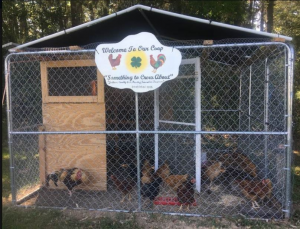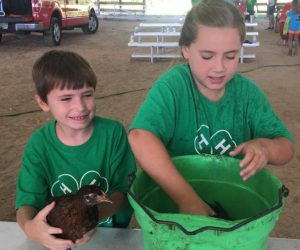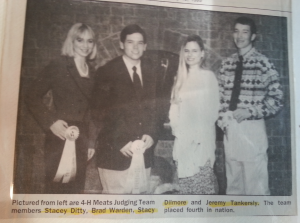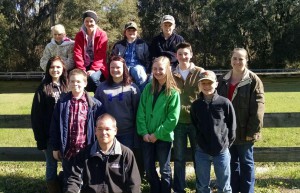by amgranger | Mar 29, 2018

Many Extension Offices offer Cooperative Coops for youth who live in areas that are not zoned for poultry – UF/IFAS Jackson County Extension 4-H Program
Photo Credit: Angel
If you have been entertaining the idea of adding chickens to your personal “flock”, then we have some news for you! Not only would you be adding a sustainable practice at your home, your youth would have amazing opportunities to learn, develop valuable life skills and explore opportunities in 4-H. Youth from all walks of life (urban and rural) are involved in 4-H poultry projects. Here’s the scoop on getting started with backyard coops:
- Location– the first thing you need to find out is whether or not your location is zoned for poultry and whether or not there are any building restrictions. If there are no restrictions on your property, you will want to select a location that is relatively flat, has good drainage, access to electricity and water, and some natural shade if possible. If you do live in a restricted area, contact your local UF IFAS County Extension Office– many offices have cooperative coops where youth can participate in the poultry project, even if they can’t have their own backyard coop.
- Goal– Next, you need to consider what your goal is. Do you plan to produce just eggs or are you considering producing your own meat? Are you more interested in showing your chickens? How big of an operation are you planning?
- Coop Size– Are you planning to allow your birds to free-range or stay in an enclosed pen? Birds that are allowed to roam free during the day do not need as large a coop. If you are planning to keep your birds cooped up to keep them safe from neighborhood dogs or wildlife, you will need a larger coop. Also, the number of birds and breeds you want to have will impact your coop size. Here are the general rules of thumb when it comes to coop size:
- Heavy breeds– such as Australorp, Barred Rock, or Buff Orphington need 4 square feet of space if allowed out to forage during the day, but 10 square feet of space per bird if they are kept in the coop.
- Light breeds– such as Leghorn, Araucana or Silkies need 3 square feet of space per bird if allowed to forage, but 71/2 square feet of space per bird if kept in the coop.
For more information on selecting breeds, check out this article: Which Breeds are Best for Backyard Poultry.
- Coop Style– Chickens have been around for thousands of years so they are pretty resilient, but you still need to consider giving them proper shelter and protection from the elements and predators. Make sure that your coop has the capability to repel predators that fly, dig or crawl. Chickens are susceptible to birds of prey such as hawks and owls as well as predators on the ground including snakes, opossums, raccoons, coyotes, dogs and cats. There are many styles to choose from and you can spend a lot or a little, depending on your budget or your skills as a carpenter! Links to a few example coop plans are provided in the resources below. Many hardware and feed supply stores have “coop kits” for sale that are easy to put together. Generally, these coops are for small numbers of birds and are easy to remove should you change your mind about having a backyard flock later. The coop shown above was constructed with a 10 x 10 chain-link dog kennel and a canvas kennel cover. The roof and sides were laced with poultry wire which was also buried 8-10 inches in the ground around the perimeter. An enclosed area with laying boxes was constructed out of scrap lumber, an old screen door and a roll of window screen. All of the components give the birds protection from the elements and predators. Make sure that your coop site has access to electricity and water.

Chick Chain Participants
Photo Credit: A. Granger, UF/IFAS Jackson County Extension
If you have decided to incorporate some of the 4-H activities such as embryology or Chick Chain, you will be starting with day-old chicks that will require a little different living environment, at least until they can keep themselves warm and are big enough to be put on the ground. Regardless of the age of the birds, make sure that you are providing adequate amounts of fresh feed and clean water every day.
Once your birds are mature enough to lay eggs or be used for meat, you will enjoy having a great source of protein and a valuable teaching tool for youth. Learning skills such as record keeping and responsibility are just two of the skills that come to mind. Not to mention opportunities in learning to show or exhibit birds, learning about poultry and meats judging, earning scholarships in the 4-H Tailgate Cookery Contest and developing entrepreneurial skills in producing eggs or meat for your family or others.
There are multiple opportunities in 4-H poultry project. If you are interested in participating, either as a youth member or an adult volunteer, contact your local UF IFAS County Extension Office or visit http://florida4h.org.
Resources:
Backyard Flocks
Florida 4-H Chick Chain Project
Florida 4-H Poultry Project Page
Florida 4-H Embryology Program
4-H Poultry Judging
Life Skill Development Related to Participation in 4-H Animal Science Projects
by amgranger | Apr 14, 2015

Brad and Stacey at the 1995 National 4-H Meats Judging Contest
Stacey (Ditty) Warden joined the Lovedale 4-H Club at the age of ten as a shy girl not knowing just how drastically 4-H would impact her life. She joined upon the recommendation of her aunt, who had just started working at the Extension Office as the new 4-H Secretary. One of Stacey’s first projects was poultry judging. A few years later, she met her future husband, Brad Warden, while attending the 4-H Ham and Hog workshop in Gainesville. Stacey and Brad showed cattle and participated on the 4-H Livestock, Poultry and Meats Judging teams at the county, state and national levels. They attribute their success to supportive parents as well as their former 4-H Agent, Shelia Andreason, who now works for Alabama 4-H. Shelia remembers their determination and dedication, “4-H was a safe place for kids to learn how to compete in a competitive world. Brad and Stacey easily mastered the vocabulary, points to evaluate, and steps to give a logical set of oral reasons and were able to transition from one judging topic to the next. I am very proud to see them coaching judging teams for Jackson County as alumni of the program 20 years later!”
Brad and Stacey also transitioned from childhood friends to teenage sweethearts. They married soon after high school graduation and have been married 18 years. They have two children, Hayden and Eden. Today, their son Hayden shows steers and participates in poultry, livestock, and meats judging. Eden is not yet old enough to join 4-H, but is a ‘future 4-Her in training.”
Last year, Brad and Stacey decided to start a 4-H club so that other youth (including their own) could benefit from 4-H the same way they did. “Kids need an outlet to learn about agriculture and livestock and we wanted to continue the strong tradition of livestock judging in Jackson County.” Their passion for 4-H is contagious. Their club is one of the fastest growing clubs in the county, with nearly 50 members. “It was a real eye opener to see how many youth and parents were attracted to learning about livestock. Many of them had never owned an animal or participated in a judging contest before joining 4-H. We were amazed at the response we got,” said Stacey.
One of the reasons that this club is so popular is because Brad and Stacey are passionate advocates for 4-H. They are quick to share why learning about agriculture is still relevant today, despite a decrease in the number of “farm kids.” Stacey shares, “Jackson County is an agricultural county. Kids need to know about agriculture in order to grow up to be informed consumers, stewards, and citizens. Poultry judging is a great way for kids to get started in agriculture. It teaches them about quality control, communication, and reasoning skills. The skills they learn are very practical and relate to everyday life. 4-H is a true testament to what the programs teach the youth. Once parents see what the kids are learning, they want their kids involved.”
“I tell parents all the time that I would not be the person I am today if I had not joined 4-H. I was a poor farm girl that had never been outside of Jackson County. 4-H helped me learn how to speak in front of others, build confidence, and gave me so many opportunities I would not have had otherwise. This is what is missing in other programs, which tend to just focus on fun activities. In 4-H, activities are fun, but they also help youth develop valuable life skills that will carry them through school and their future career. 4-H focuses on the big picture of positive youth development, and kids are hungry for that kind of learning because they can’t get it anywhere else.”

Brad and Stacey with members of their livestock judging team in 2015.
Brad and Stacey attribute the success of their club not only because of the content they teach, but also to a dedicated group of 4-H parents who are willing to pitch in and help out whenever needed. 4-H parents Stephen and Casey Roach shared, “We are so thankful that we have the opportunity to be a part of a 4-H club where the leaders get more excited about the kids’ accomplishments than the kids do! Brad and Stacey cheer on all the 4-H members and encourage them to do their best. They’ve done such a tremendous job that the kids are placing in competitions, gaining confidence, and learning valuable information about livestock. We couldn’t be happier or more appreciative of all that Brad and Stacey do for the Jackson County 4-H Livestock Club.”
There are no guarantees that you will meet your future spouse in 4-H, but you will reap benefits by sharing your passion and expertise as a 4-H volunteer! 4-H alumni like Brad and Stacey make ideal volunteers. Stacey advises “Jump right in- don’t hesitate! We were not sure about it at first, but with support from our 4-H Agent, other parents and the community, things have fallen into place. It is not nearly as intimidating as we thought it would be.” To find out how you can leverage your skills and experience as a 4-H volunteer, contact your local Extension Office or visit http://florida4h.org/volunteers.
Your opinion matters to us! Please take this short survey to help us improve our blog https://ufl.qualtrics.com/SE/?SID=SV_3gtLKjqia3F75QN.




